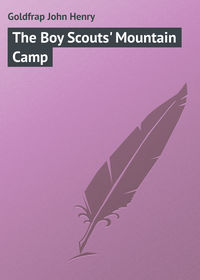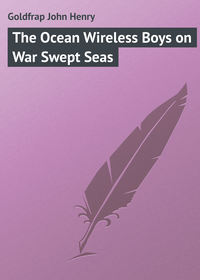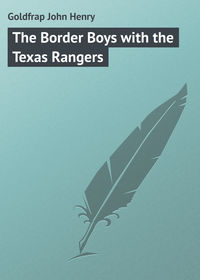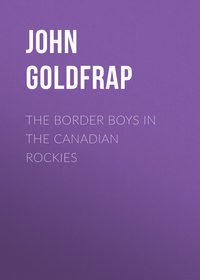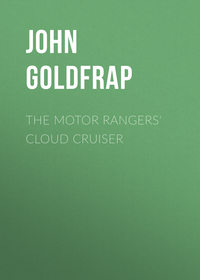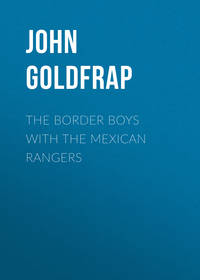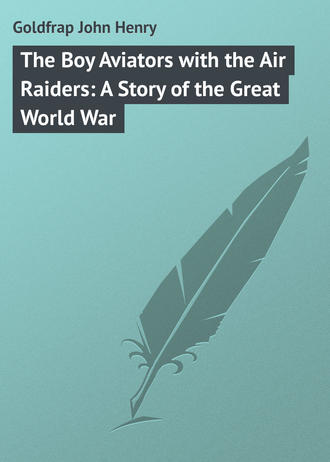 полная версия
полная версияThe Boy Aviators with the Air Raiders: A Story of the Great World War
He was more inclined to believe, however, that the German spies, rendered furious by the escape of the coveted American seaplane had, as a last resort, started out to scour the water nearby in hopes of locating it.
“Frank!” whispered Billy again, “I think he glimpses the seaplane through the fog!”
The actions of the man holding the lantern indicated this, for he was plainly much excited, turning to his companion at the oars as though urging him to make more haste.
“Then it’s high time we were off!” said Frank.
Again did Billy hold his breath as the possibility of the motors failing them in this great emergency flashed through his mind. But he need not have allowed himself this mental anxiety, for no such calamity befell them.
A shrill whistle was heard, evidently a signal to those in the second boat to inform them that the object of their search had been discovered. Then came the cheery whirr of the motors, accompanied by the churn of the busy propellers, and like a giant, double-winged dragonfly, the seaplane started along the surface of the water, followed by another burst of angry shouts.
“Duck! they may be going to shoot!” exclaimed Frank, suiting his actions to his own words.
That was just what did happen, for a volley of shots sounded, and had the motors not been making so much noise the boys might have heard the whistle of the passing leaden messengers.
There was no harm done, for, unable to longer see the speeding seaplane, those who used their weapons with such reckless abandon had to fire at random. Skimming the water like an aquatic bird, with a gradual but rapid increase to their speed, the seaplane soon began to rise.
Billy realized from that that Frank meant to make an ascension, possibly deeming it wise to get away from such a dangerous neighborhood as quickly as possible. And, as they anticipated, the reliable Sea Eagle was doing her prettiest when called upon to show her fine points.
Once free from the sea, they rose until Frank felt sure of his position. He had switched on the electric searchlight, and the storage battery was of sufficient power to send the ray of white light far ahead. It could be turned to any quarter of the compass.
“Well, here we are off on our trial trip sooner than we expected,” said Billy, meaning to draw the other out, for he was consumed by curiosity to know what was coming next.
“Two narrow squeaks on one night ought to be enough, don’t you think, Billy?” asked the pilot, as he started out into that avenue of light, and then glanced at the handy compass so as to fix their course on his mind.
“Well, we’ve been pretty lucky so far,” admitted the other. “It wouldn’t pay to keep up that sort of racket. They say, you know, that the pitcher may go to the well just once too often. It might be three times and out for us.”
“And neither of us feels like accommodating those anxious German secret agents whose one business in Dunkirk is to steal our thunder, do we, Billy?”
“Not much,” replied the other boy with decided emphasis. “I’d sooner see the airship smashed to pieces than know it had fallen into the hands of the Kaiser’s men.”
“Hold on, Billy! You know we’re supposed to be neutral in this fighting business. We’ve got some mighty good friends who are of German blood, and we think a whole lot of them, too.”
“Oh! I’m not saying a word against Germans; they’re as fine a people as any in all the world; but, Frank, what we’ve met with in Northern France and in the little of Belgium we saw that day Major Nixon took us out in his motor car, somehow set me against the invaders. Anyway, we’ve been treated splendidly by the French here, and our business has been with them.”
“That’s understood, Billy, and I agree with you in all you say. But let’s talk now about our chances of dropping down again to the water.”
“Oh! then you don’t mean to stay up here, Frank? Will it be safe to descend, do you think?” asked Billy, a new sense of anxiety gripping him.
“So far as the plane is concerned we can do almost anything with it,” Frank assured him. “Our light will tell us whether the sea is too rough for alighting. We’re heading downward as it is right now. Steady, Billy, and keep on the watch.”
Having taken his course, Frank knew that they must be out on the channel some miles from the harbor. On nine nights out of ten he would have hesitated about attempting such a risky proceeding as he now had in view; but the calmness that prevailed encouraged him to take the chances of a descent in the darkness.
“I can see the water all right, Frank!” exclaimed Billy a minute later, as the wonderful air and water craft continued to head downward, though with but a gradual descent.
“It looks good to me,” ventured the pilot, with confidence in his tone.
Presently they were so close to the surface of the water that both of the boys could see that it was fairly quiet. The long rollers were steadily moving toward the southeast, as though the night air influenced them, but then Frank had before now dropped down on the sea when it was much more boisterous.
“Here goes!” he remarked, as he deflected the rudder just a trifle more, and immediately they struck the water.
The Sea Eagle, being especially constructed for this sort of work, and having a spoon bow that would not allow her to dip deeply, started along on the surface, with the motors working at almost their lightest speed. Then Frank cut off all power.
“We did it handsomely, Frank!” exulted Billy Barnes, feeling quite relieved now that the seaplane had proven fit and right for the business it had been built to demonstrate.
“And here we are floating again,” said Frank, “but this time so far away from the harbor of Dunkirk that there’s no longer any danger from spies. Billy, since that star has dipped behind the horizon, suppose you take your little twenty winks of sleep.”
“You think it’s perfectly safe to lie here the rest of the night, do you, Frank?”
“Why not, when we can get away if the wind should come up, and the sea prove too rough for us? Make your mind easy on that score, Billy.”
“But how about steamers crossing from the other side of the channel?” asked Billy. “I think I heard that they generally take the night to make the trip these times, so as to keep the German aviators from learning how many transports loaded with troops come over. Besides, they avoid danger from submarines, and bombs dropped from Zeppelins that way.”
“Oh! the chances of our being run down are so small that we needn’t bother about them,” Frank assured the nervous chum. “I promise you that if I see a moving light, or hear the propeller of a steamer, I’ll wake you up, and we can stand by, ready to go aloft in case the worst threatens.”
That seemed to appease Billy, for he gave a satisfied grunt and proceeded to settle himself for a nap.
“This is being ‘rocked in the cradle of the deep,’ all right,” he remarked, as the floating seaplane rose and fell on the swell. Frank made no reply, so that presently Billy relapsed into silence, his regular breathing telling the other he was sound asleep.
So the long night crept on. The boys managed to catch more or less sleep, for nothing arose to alarm them. Naturally, their position was far from a comfortable one, and therefore Frank, who happened to be on duty at the time, felt pleased more than words could tell when he eventually glimpsed a light in the eastern sky that proclaimed the coming of dawn.
CHAPTER VI.
UNDER SHRAPNEL FIRE
“Have we anything to eat along with us, Frank?”
“Why, hello! are you awake, Billy? I was just thinking of calling you, or sending a bell hop up to pound on your door. It’s morning, you see.”
“Yes, I noticed that light over there in the east, and was thinking how the poor fellows in the trenches must feel when they see it creeping on, knowing as they do that it means another day of hard work and fighting. But how about my question, Frank? Did we think to fetch that pouch of ship-biscuit along with us?”
“Yes, it’s tied just back of you,” the other informed him with a laugh. “But I’m surprised to hear you so keen for a bite, Billy. If it had been Pudge, now, I wouldn’t have thought so much about it, because he’s always ready for six meals a day.”
“I don’t know what ails me,” acknowledged the other, as he reached for the little waterproof bag in which Frank always tried to keep a pound or so of hardtack, with some cheese as well, to provide for any emergency like the present, “it may be this sea air, or perhaps it’s due to the excitement we’ve gone through; but I’m as hungry as a wolf in winter.”
“Perhaps I may take your appetite away then,” suggested Frank, with a chuckle.
“In what way?” demanded Billy, with a round ship biscuit halfway to his mouth.
“Oh! by making a stunning proposition I’ve been considering while I sat here, that’s all.”
“Gee! it takes you to think up things, Frank. Now, as for me, I’ve been badgering my poor brains about how we would astonish the people of Dunkirk when we came sailing into the harbor and made for our hangar. There’d be as much excitement as if a dozen of those little Taube aëroplanes of the Germans had hove in sight, just as they did on that day of the last air raid. Now tell me what the game is, please, Frank.”
“Suppose, then, we weren’t in such a big hurry to go back to our moorings?” said the other. “Suppose, that having broken away, we took that trial spin we’ve always been promising ourselves when things were ready!”
Billy became so excited that he actually forgot to eat.
“Wow! that’s a brilliant scheme, Frank, let me tell you!” he exclaimed. “Say, for a wonder, all the conditions favor aëroplane work. The wind that has kept up during the last three days seems to have blown itself out, and we’re likely to have a quiet spell. They’ll be on the watch for another raid of those Taubes from up Antwerp way on such a calm day as this. Frank, shall we try it?”
“Wait for another half hour,” replied the other. “By then it will be broad daylight, and we can see what the signs promise. If things look good we’ll start up and take a run to the northeast.”
“Over the trenches, do you mean, and perhaps far into Belgium?” cried Billy, to whom the prospect of seeing something of the terrible fighting that was daily taking place in the lowlands along the canal appealed with irresistible force; for the old reporter spirit had never been killed when he gave up newspaper work for aëroplane building.
“We’ll see how the land lies,” was all Frank would say. Billy knew very well the other was bound to be just as keenly interested in the warlike scenes below them as he could be, hence he was willing to check his impatience, leaving everything to Frank.
Both of them munched away on the ship-biscuit and cheese. It was pretty dry fare, but then there was a bottle of water at hand if they felt choking at any time.
The half hour passed and they could see from the growing light in the eastern sky that the sun would soon be making its appearance. Around them there was nothing but an endless succession of rollers, upon which the buoyant seaplane rose and fell with a continual gurgling sound.
“If this low-hanging fog would only lift,” remarked Billy, as he put away the hardtack bags, “we could tell just where we were. As it is, there’s no such thing as seeing land, which must be over there to the east.”
“The sea fog is rising and will disappear as soon as the breeze comes,” Frank observed sagaciously. “By then we want to be several thousand feet up, and taking a look through the glasses at the picture we’ll have spread out below us.”
“Let’s start now,” suggested Billy. “I’m wild to see what the country up across the border of Belgium looks like. To think of us being able to glimpse all the German defenses as we go sailing over so smoothly.”
Frank laughed.
“You are counting your chickens again before they’re hatched, Billy, an old failing of yours. It may not be the smooth sailing you think. Remember that the Germans are always ready-primed with their wonderful anti-aëroplane guns for hostile raiders. We may have a dozen Taubes, too, buzzing after us, or find ourselves chased into the clouds by a big Zeppelin.”
If Frank thought to alarm Billy by saying this, he immediately saw that he had failed to shake the other’s nerve.
“Gee! that would make it interesting, for a fact!” the other exclaimed, his face beaming with eagerness. “Frank, you can take my word for it, no Taube, or Zeppelin either, for that matter, can catch up with our good old Sea Eagle, once you crack on all of her two thousand revolutions a minute with both motors. They haven’t got a thing over on this side of the big pond that is in the same class with Doctor Perkins’s invention.”
“I think you’re pretty near right there, Billy,” said the pilot, as he proceeded to press the button that would start things humming.
Immediately they were beginning to move along on the surface, the peculiar spoon-shaped bow preventing the water from coming aboard. Faster went the huge seaplane as Frank gave increased power, until when he tilted the ascending rudder they left the water just as a frightened duck does after attaining sufficient momentum.
“Hurrah!” exclaimed the delighted Billy, as soon as he realized, from the change in motion, that they no longer rested on the water, but were cleaving the air.
Mounting in spirals, as usual, the two boys soon began to have a splendid view, not only of the sea, but of the nearby land as well.
“Oh! look, Frank, over there in the west; those must be the famous white chalk cliffs of Dover across the channel we see. To think that we are looking down at France, and even Belgium, and on England at the same time.”
“That’s about where the Kaiser is aiming to throw those monster shells from his big forty-two centimeter guns, after he has captured Calais, you know,” remarked Frank.
“I guess that dream’s been smashed by now, and there’s nothing in it,” Billy was saying. “Not that the Germans didn’t try mighty hard to get there, and tens of thousands of their brave fellows gave up their lives to carry out a whim of the commander, which might not have amounted to much, after all. Oh! Frank, with the glass here I can see our hangar as easy as anything.”
“That’s good, Billy. I was just going to ask you to look and see if those disappointed spies had done anything to it. I’m glad to hear you say it’s still there in good shape. I expect we’ll have more or less need of that shed from time to time.”
“Well, we don’t mean to spend many nights paddling around on the sea,” affirmed Billy, now beginning to turn his glass upon the country they were approaching, and which lay to the north of Dunkirk.
Frank had changed their course so that they were now over the land. They could easily see the camps of the British troops, though they were so far above them that moving companies looked like marching ants. The tents could not be concealed, and there were besides numerous low sheds, which doubtless sheltered supplies of every description, needed by the army fighting in the trenches further north.
As Frank drew more upon the motors that were keeping up a noisy chorus, the huge seaplane rushed through the air and gave them a change of landscape every little while.
The sun was in plain sight, although just beginning to touch things below with golden fingers. Covering land and water, they could see over a radius that must have been far more than fifty miles.
Billy kept uttering exclamations, intended to express the rapture that filled his breast. In all his experience he had never gazed upon anything to compare with what he now saw spread out below him as though upon a monster checkerboard. African wilds, Western deserts and Polar regions of eternal ice were all dwarfed in interest by this spectacle.
Again and again did he call the attention of his chum to certain features of the wonderful picture that especially appealed to him. Now it was the snakelike movements of what appeared to be a new army heading toward the front, accompanied by a long line of big guns that were drawn by traction engines. Then the irregular line of what he made out to be the opposing trenches riveted his attention. He was thrilled when he actually saw a rush made by an attacking party of Germans, to be met with volleys that must have sadly decimated their ranks, for as Billy gazed with bated breath he saw the remnant of the gallant band reel back and vanish amidst their own trenches.
“Am I awake, Frank, or asleep and dreaming all this?” Billy exclaimed, as he handed the glasses to his chum.
This Frank could readily do because they were running along as smoothly as velvet, and long habit had made him perfectly at home in handling the working parts of the seaplane.
“I wonder what they think of us?” wondered Billy. “You may be sure that every field glass and pair of binoculars they own is leveled at us right now. They must think the French or the British have sprung one on them, to beat out their old Zeppelins at the raiding business! Oh! wouldn’t I give something to be close enough to the commanding general to see the look on his face.”
Frank was looking for something else just then. Although they were flying at such a great height, he fancied that the present security would hardly last. The Germans were only waiting until they had gone on a certain distance; then probably a dozen of their hustling little Taube machines would spring upward and chase after the singular stranger like a swarm of hornets, seeking to cut off escape, and hoping by some lucky shot to bring it down.
The barograph was in plain sight from where Frank sat, and perhaps the quick glance he gave at its readings just then had some connection with this expectation of coming trouble.
Billy interpreted it otherwise. He was afraid Frank, thinking they had gone far enough, was sweeping around to start back toward the British trench line.
“Just a little further, Frank,” pleaded Billy. “There’s a big move on over yonder, seems like, where that army is coming along; and I’d like to see enough to interest our good friend Major Nixon when we get back.”
“I don’t know whether I’ll let you say a single word, Billy,” the air pilot told him, as he relinquished the glasses to the eager one. “That wouldn’t be acting neutral, you know. Besides, there are plenty of the Allies’ machines able to fly, and those airmen like Graham-White ought to be able to pick up news of any big movement.”
They could see patches of snow in places, and much water in others where the low country had been inundated by the Belgians. This was done in hopes of hastening the retreat of the invaders, who despite all had stuck to their trenches and the unfinished canal for months, as though rooted there.
All at once there sounded a loud crash not far below the young air pilots, and a puff of white smoke told where a shrapnel shell had burst.
“Frank, they’re firing at us!” exclaimed Billy, who had made an involuntary ducking movement with his head as the sharp discharge burst upon his ears.
Even as he spoke another, and still a third crash told that the Germans had determined the time was at hand to try their anti-aëroplane guns on the strange seaplane that was soaring above the camps.
CHAPTER VII.
THE “SEA EAGLE” ON PARADE
“That means we’ll have to climb higher, so that their guns can’t reach!” Frank immediately decided.
It was indeed getting rather warm around them, Billy thought. The shrapnel puffs seemed to be above, below, and on every side, and it was a wonder that neither of them received a wound.
“Only for the speed we’re hitting up, the story might be a whole lot different, according to my notion, Frank. They have a hard job to get our range, you see.”
“Yes, most of it bursts back of us, showing a faulty figuring,” the pilot explained, as he started a corkscrew movement of the seaplane calculated to cause the aircraft to bore upward in spirals.
The guns, far below, kept up a merry chorus. Billy could hear the faint noise made by the continuous discharges, and the puffs of smoke that seemed to rise in a score of places at the same time told him how eagerly the German gunners were trying to strike that elevated mark.
Now the shrapnel ceased to worry Billy, for he saw that none of it seemed to be bursting around them as before. The limits or range of the anti-aircraft guns had apparently been reached.
“We’re safe from the iron rain up at this height, Frank. What does the barometer say?” he asked, with that spirit of curiosity that had made him a good reporter in the old days.
“That’s too bad,” replied Frank, as he bent forward to look.
“Don’t tell me that the only fragment of a shell that’s struck home ruined our fine barometer!” cried Billy.
“Just what happened,” he was told. “At any rate, it’s knocked to flinders; and I think I must have had a pretty close shave. But we can buy a new one when we get back to Dunkirk. As near as I can give a rough guess we must be between three and four thousand feet high.”
“I should say it was a lot more than that,” Billy declared. “But so long as they can’t reach us any longer, why dispute over a few thousand feet?”
He thereupon once more started to make use of the glasses, and had hardly settled them to his eyes than he gave a startled cry.
“Frank, they’re coming up like a swarm of angry bees!” Billy exclaimed.
“Do you mean Taube aëroplanes, Billy?”
“Yes, I can see as many as six right now in different directions, and others are going to follow, if looks count for anything. The word must have been given to attack us.”
“I’m not worrying any,” Frank told him calmly. “In fact, I don’t believe they’ll try to tackle such a strange hybrid aircraft. They can see how differently constructed the Sea Eagle is from all other hydro-aëroplanes, and expect that we must mount at least one quick-firing gun.”
“Then what are they climbing for, Frank? I can hear the buzz of their propellers right now, and let me tell you it sounds like ‘strictly business’ to me!”
“They are meaning to get close enough to let the pilots see what kind of a queer contrivance it is that’s hanging over their camps,” Frank continued in a reassuring manner. “When we choose to turn tail and clear out, there isn’t one in the lot that can tag on after us.”
“I know that, Frank, thanks to those wonderful motors, and the clever construction of Dr. Perkins’ model. But now here’s new trouble looming up ahead.”
“I can see what you mean, Billy. Yes, that is a Zeppelin moving along down there, one of the older type, I should say, without having used the glasses.”
“But surely it will make for us, Frank. A real Zeppelin wouldn’t think of sheering off from any sort of aëroplane.”
“Watch and see what happens,” Billy was told, as Frank changed their course so as to head straight for the great dirigible that was floating in space halfway between their present altitude and the earth that lay thousands of feet below.
The firing had stopped. Probably the German gunners, having realized the utter futility of trying to reach the Sea Eagle while it remained at such a dizzy height, were now watching to see what was about to take place. Many of them may have pinned great faith in the ability of their aircraft to out-maneuver any similar fliers manipulated by the pilots of the Allies. They may even have expected to see a stern chase, with their air fleet in hot pursuit of this remarkable stranger.
If this were really the case, those same observers were doomed to meet with a bitter disappointment.
“Well, what does it look like now?” Frank asked presently, while his companion continued to keep the glasses glued to his eyes as though fairly fascinated by all he saw.
“The Zeppelin has put on full steam, I should say, Frank,” admitted Billy.
“Coming to attack us?” chuckled the other, though the motors were humming at such a lively rate that Billy barely caught the words.
“Gee whillikins, I should say not!” he cried exultantly. “Why, they’re on the run, Frank, and going like hot cakes. I bet you that Zeppelin never made faster time since the day it was launched. They act as though they thought we wanted to get above them so as to bombard the big dirigible with bombs.”
“And that’s just what they do fear,” said Frank positively. “That’s the greatest weakness of those big dirigibles, they offer such a wide surface for being hit. While an ordinary shell might pass straight through, and only tear one of the many compartments, let a bomb be dropped from above, and explode on the gas bag, and the chances are the Zeppelin would go to the scrap-heap.”


